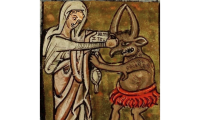PROGRAMME
Riccardo Nova:
The book of women | StrI parvam
for an Indian Carnatic singer, three female singers and ensemble (world premiere)
Works by Perotin
Works from Llibre Vermell de Montserrat
Works from the Cyprus Manuscript
for voices and body percussion
CAST
Lila Hajosi, conductor
Varijashree Venugopal, voice
Irini ensemble, six voices
Ictus ensemble (string trio, synthesizer, trumpet and percussion)
PRODUCTION
Ma Festival Brugge
Coproduction under construction
[FIRST DESCRIPTION OF A WORK IN PROGRESS]
In two years' time, August 2025, we'll be premiering THE BOOK OF WOMEN with Lila Hajosi's Irini Ensemble at the Ma early music festival in Bruges.
It's an ambitious, historical and speculative project, combining:
- a contemporary creation commissioned from Riccardo Nova,
- music from the 14th and 15th centuries performed by Irini
In a nutshell: Lila Hajosi's long-standing objective is to explore the theme of feminine power in the late Middle Ages, specifically during the Gothic period. The aim is to evoke the power of Mary, the courage of women and all the miracles performed by the (women) saints. The authentic image that Lila has put forward is marvellous: the Virgin known as piena di grazia, who puts her fist in the Devil's mouth: OUCH!
(Third image on this page, from The De Brailes Hours, Oxford 1240, British Library)
Lila Hajosi has already proved with her two outstanding CDs (listen to Maria Nostra! Now!) that she knows how to put together a program that is both heterogeneous and unified, assembled with intelligence and fervor.
She is currently considering the following repertoire:
- Perotin's Beata Viscera (...and other Beata Visceras)
- Cunctissimus concanentes and other pieces from Llibre Vermell de Montserrat, 14th century
- The Cyprus Manuscript (subtilior subtiliorum ;)
It won't be a mass at the Ecole des Enfants de Marie, this is guaranteed! Instead, it's going to be loud, very loud – seven passionate singers with body percussion in the mix.
Then there is the new commission by Riccardo Nova. After some very sulphurous, almost "noise" episodes, he is now returning to the counterpoint of his youth, when he studied in Milano. He brings forth his "hands-on" knowledge of South Indian carnatic music with its isometric rhythms and refined intonation. His latest productions are magnificent: they're alta maturità. Nova wants to work on the "female" scenes from the Mahabharata.
We will be joined by Varijashree Venugopal, an extraordinary singer already featured in "Mantras, Fights and Threnody", created in 2023 by MusikFabrik with Peter Rundel. Next to her incredibly singular voice, Riccardo Nova will integrate three Irini singers, including the very special Julie Azoulay. Julie's particular background brings her close to Indian vocal practices in many respects (portamento, for example). What’s more – a small "portable" instrumental ensemble (percussion, trumpet, string trio and microtonal synthesizer) will play alongside the vocal prowess.
Riccardo Nova's first idea was to write a great scene of deploratio (a threnody): the women are searching for traces of fathers and husbands on the battlefield after the battle. After a fascinating and funny conversation with Lila Hajosi ("Mmmh... I prefer warriors to weeping women!"), Riccardo chose to treat another scene from the Mahabharata: thanks to a magic mantra, Princess Kunti takes power over the male gods. (OUCH!)
The intuition for the project is strong and generates a lot of energy on all sides. There's the idea of an organic encounter between past and present, Europe and its Others, through the presentation of femininity as power. There's also the notion of transcendental, timeless feminism, that deserves to be investigated by the contemporaries: an investigation at the level of ideas, but also at the level of affects and passions.
En août 2025, nous créerons LE LIVRE DES FEMMES avec le Irini Ensemble de Lila Hajosi au festival de musique ancienne Ma à Bruges.
Il s'agit d'un projet ambitieux, à la fois historique et spéculatif, combinant :
- une création contemporaine commandée à Riccardo Nova,
- de la musique des 14e et 15e siècles interprétée par Irini.
En bref : cela fait longtemps que Lila Hajosi gardait dans ses tiroirs un projet autour de la question du pouvoir féminin à la fin du Moyen-Âge, en particulier pendant la période gothique. L'objectif est d'évoquer le pouvoir de Marie, le courage des femmes, et tous les miracles accomplis par les saintes. L'image — authentique — proposée par Lila est merveilleuse : la Vierge dite pleine de grâce, qui met un poing au Démon : OUCH !
(Troisième image de cette page, tirée de The De Brailes Hours, Oxford 1240, British Library)
Lila Hajosi a déjà prouvé avec ses deux remarquables CD (écoutez Maria Nostra ! Now !) qu'elle sait composer un programme à la fois hétérogène et unifié, assemblé avec intelligence et ferveur.
Elle envisage actuellement le répertoire suivant :
- Beata Viscera de Perotin (...et autres Beata Visceras)
- Cunctissimus concanentes et autres pièces de Llibre Vermell de Montserrat, 14e siècle
- Le Manuscrit de Chypre (subtilior subtiliorum ;)
Ce ne sera pas la messe à l'Ecole des Enfants de Marie, nous le garantissons !!
Cela va chanter fort, bien fort, avec 6 chanteuses passionnées — et même les percussions corporelles seront de la partie.
Vient ensuite la nouvelle commande de Riccardo Nova. Après des épisodes très sulfureux, quasi « noise », il revient aujourd’hui au contrepoint de sa jeunesse, lors de ses études à Milan.
Il y mêle à tout un savoir « appris sur le terrain » sur la musique karnatique du Sud de l’Inde, avec ses rythmes isométriques et son raffinement d ’intonation. Ses dernières productions sont magnifiques, c’est la alta maturità. Nova veut travailler sur les scènes "féminines" du Mahabharata.
Nous engagerons Varijashree Venugopal, l’extraordinaire chanteuse déjà en vedette dans « Mantras, Fights and Threnody », créée en 2023 par MusikFabrik avec Peter Rundel.
À cette voix tout à fait particulière, Riccardo ajoutera trois chanteuses de Irini, parmi lesquelles la très spéciale Juliette Azoulay. Le background très particulier de Juliette la rend proche des pratiques vocales indiennes, sur bien des aspects (par exemple le portamento). À cela s’ajoutera un petit ensemble instrumental « portatif » (percussion, trompette, trio à cordes et synthétiseur microtonal).
La première idée de Riccardo était d’écrire une grande scène de deploratio (a threnody) : les femmes sur le champ de bataille, après la bataille, cherchent des traces des pères et des maris. Après une conversation passionnante et drôle avec Lila Hajhosi (« aux femmes qui pleurent, je préfère les guerrières ! »), Riccardo a choisi de traiter également une autre scène du Mahabharata : grâce à un mantra magique, la princesse Kunti prend le pouvoir sur les dieux mâles. OUCH! (bis).
Voilà… L’intuition du projet est très forte et suscite beaucoup d’énergie de tous les côtés.
Il y a l’idée d’une rencontre très organique entre le passé et le présent, l’Europe et ses Autres, à travers l’idée de la féminité comme puissance. Il y a aussi l’idée d’un féminisme transcendantal, intemporel, qui mérite que les Contemporains fassent leur petite enquête : une enquête au niveau des idées mais aussi au niveau des affects et des passions.



